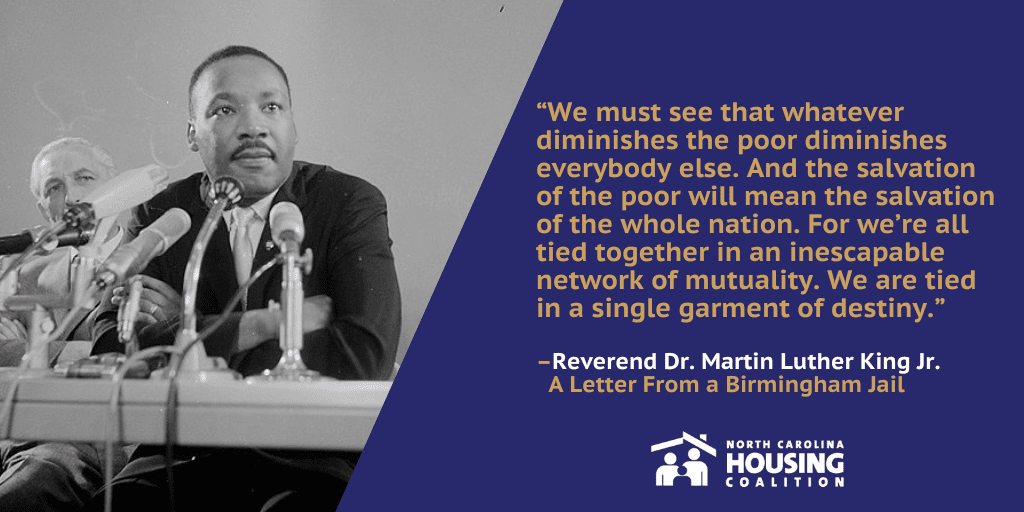“Hate is too great a burden to bear. I have decided to love. If you are seeking the highest good, I think you can find it through love.”
–1967 Atlanta, Georgia. Dr. Martin Luther King Jr. addresses delegates at the Southern Christian Leadership Conference in a speech titled: Where do we go from here?

This is one of my favorite quotes by the late Reverend Dr. Martin Luther King Jr. I have always appreciated it, although its meaning for me has changed throughout various phases over time with my life and line of thinking. I used to consider it an ode to the importance of optimism. A symbol of positivity or inspiration. These days, it rings more like a solemn truth and reminder about what really matters, and what is worth carrying. It feels like a reminder worth carrying close in light of all that has changed over the last few years and all that remains unchanged over 54 years since Dr. King was assassinated on April 4, 1968. One week later, the Fair Housing Act of 1968 was passed.
When you consider the words “love” and “fair,” what comes to mind? How does this translate to the policies and procedures and programs that shape our communities?
I ask this question because like many reading this you may understand the weight of advocating for something and believing in something. If you are a believer in the concept of “housing as a human right,” you understand this weight. If you are or have ever been someone who has lost their home, been evicted, been homeless, lived paycheck to paycheck, lived in less than healthy and safe conditions to have a roof over your head, experienced chronic hunger or economic instability, or have felt the fear of not knowing what tomorrow might hold in terms of shelter and means, then you not only understand the importance of this concept, but you have carried the crushing weight from experiencing the consequences of not treating housing as a human right.
Disparities persist. Justice is still needed.
When the Fair Housing Act was passed in 1968, Black homeownership levels were disproportionately lower than that of the average white household . A generation later, the gap has not changed, at least not in the right direction. Black homeownership fell in 2019 to 40.6% down from the 2004 peak of 49.7% (Pew Trust, 2022). The haunting consequences of redlining, the Great Recession, impacts of gentrification, and the increasing number of homes being purchased by investors have only increased this disparity in homeownership, which is larger now than it was in the early 1960s before the 1968 Fair Housing Act and other civil rights legislation outlawed discrimination (Pew Trust, 2022). U.S Census Bureau data shows that in 2022, 74.6% of White households owned their homes, compared with 45.3% of Black households, a gap of over 29 points. In 1960, the White homeownership rate was 65% and the Black homeownership rate was 38%, a 27 point gap.
The consequences of low and inconsistent federal and state funding for affordable housing and community development and the rise in demand on local governments to fill the gaps is evidence that housing is not treated as a human right yet in our society. The disparities that existed while Dr. King was alive have persisted, and in many instances like mentioned above, have gotten worse.
Housing as a Human Right means choosing love and recognizing our connections to each other.
Treating and acknowledging housing as a human right stems from choosing love and justice over status quo comfort and individual gains. Love has several definitions in the Merriam Webster dictionary. One definition for love includes being “unselfish, loyal, and benevolent – concern for the good of another.” Justice is not about winning for the sake of winning, but rather achieving something for a cause, for a common purpose. Everyone needs housing, no matter who they are. And our communities suffer, some more than others, when we treat housing as a privilege instead of a human right, when we treat it as an amenity rather than a necessity. We must recognize that our success as a nation, as a state, and a people are intricately connected.
“We must see that whatever diminishes the poor diminishes everybody else. And the salvation of the poor will mean the salvation of the whole nation. For we’re all tied together in an inescapable network of mutuality. We are tied in a single garment of destiny.”
–Reverend Dr. Martin Luther King Jr., A Letter From a Birmingham Jail
We know now more than ever before that housing is more than four walls and a roof. We know that it impacts health, learning, economic development, community recovery and resilience, and individual and generational outcomes. It is not a partisan right, but a human one.
I hope that as we reflect on the life of this outstanding leader and kick off a new year, we remember why housing matters for all of us, not just some.








